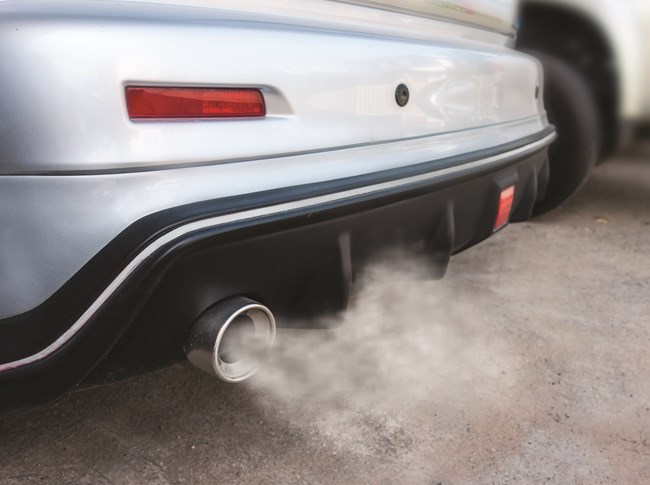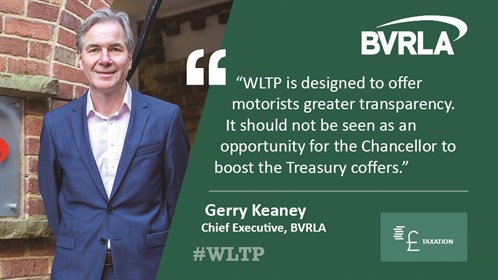
The start point for the best source of fleet information |
Government could set back own green strategy, warns fleet industry
Date: 26 February 2019 | Author: Simon Harris

The government has been warned it risks derailing its own Road to Zero strategy if it fails to take action to mitigate the effect of WLTP on vehicle taxation.
A consultation launched in December, as Whitehall reviewed the impact of WLTP on vehicle taxation, came to an end on 17 February with the risk that the government would decide to do nothing.
Earlier this month, the BVRLA and Acfo urged members to respond to the consultation, outlining the potential effects of steep increases in company car tax.
In that scenario, they fear drivers would decide that running a company car is too expensive, prompting them to opt out and take a cash allowance instead.
This would result in a substantially larger grey fleet car parc, with employers losing control over the types of vehicles staff drive on business, potentially increasing their organisation's carbon footprint and ability to mandate safety features.
Both the BVRLA and Acfo made representations to the Treasury, highlighting potential problems caused by choosing to make no changes.
The BVRLA said failure to support the fleet sector with a fair and consistent tax regime will seriously threaten government attempts to decarbonise road transport.
The association used its submission to remind policymakers of the key role company cars and vehicle rental fleets have played in both buying new ultra-low emission vehicles and then reselling them into the used market.
It also cautioned that recent hikes in company car taxes, when combined with WLTP-related uncertainty and a lack of visibility on future rates beyond 2021, had already led to more employers and employees opting out of the market.
The BVRLA claimed that in most cases staff end up driving a more polluting personal lease or grey fleet vehicle. As a result, some of the fleet industry's recent progress in reducing vehicle CO2 is already being reversed. If the government fails to manage the impact of WLTP-based company car tax this trend will only accelerate.
This view was echoed by Acfo, which confirmed businesses are closing company car schemes, with employees opting for cash due to year-on-year rises in BIK tax and uncertainty over future taxation levels.
In its submission, the fleet operator organisation highlighted HMRC data showing that while the volume of company cars on the road was reducing, the tax take from drivers and companies paying Class 1A National Insurance on the benefit was increasing.
Furthermore, the Office for Budget Responsibility has already factored in an additional £500 million flooding into HM Treasury coffers as a result of the impact of WLTP on taxation by 2024.
The BVRLA said its rental company members were also responsible for reducing UK carbon emissions, pointing out that a typical rental car emits 26% less CO2 than the average car on the road, but WLTP-based vehicle excise duty is set to punish rental operators with an increase of £28 million in their combined 2020/21 tax bill.

BVRLA members have already warned that they will need to lengthen their fleet operating cycles to absorb this extra cost, reducing the speed at which they can acquire newer, cleaner vehicles.
"Our members buy nearly 1.6 million cars each year and are responsible for most ultra-low emission vehicle registrations," said BVRLA chief executive Gerry Keaney.
"Most policymakers recognise the vital part that these fleets will play in delivering the government's flagship Road to Zero and Industrial Strategy.
"We need HM Treasury to acknowledge and support the fleet sector's role by providing a fair, consistent and well-signposted tax regime.
"WLTP is designed to offer motorists greater transparency. It should not be used as an excuse to boost Treasury coffers. Without making the necessary WLTP-related vehicle tax adjustments, the Chancellor will be simply abusing his position by opportunistically raising taxes, and punishing already hard-pressed families and businesses."
Concerned that the government's continued lack of alignment of its taxation and environmental policies will result in a failure to remedy the current vehicle tax regime, the BVRLA urged industry colleagues to respond to the consultation before it closed on 17 February.
In its response the BVRLA called upon the government to demonstrate its support for businesses by:
- Adjusting future VED and company car tax bands for 2020 and beyond to account for the increase in WLTP-based CO2 figures
- Providing a legacy company car tax table for pre-April 2020 vehicles, freezing the rates at the 2018/19 level
- Providing a four-to-five-year view of future company car tax and VED bands, enabling fleets and drivers to plan their vehicle choices
- Ensuring that all CO2-related taxes and charges (e.g. congestion zones, lease rental restriction) are treated consistently under WLTP.
Caroline Sandall, Acfo deputy chairman, said: "The government cannot continue to treat company cars as a 'cash cow'. Word from the government has previously been that it sees the transition to a tax system based on WLTP CO2 emission figures as being tax neutral and it must adhere to that.
"Furthermore, if the government is to achieve its ambition to reduce vehicle emissions then it must ensure that the tax regime supports and enhances demand for company cars, the newest and cleanest cars on the roads, and make the changes as Acfo has outlined in its action plan."
The Vehicle Remarketing Association has added its support to the fleet industry's response.
Sam Watkins, chairman of the VRA, said that her organisation shared the BVRLA's concerns about how the potentially negative impact on the company car sector could have widespread repercussions.
She said: "The government's stated intention to do nothing to the bands equates to a relatively substantial increase in company car taxation.
"This is problematic in several respects and, we believe, shows a potential lack of understanding about the company car's role in both the UK motor industry and wider business community.
"Fundamentally, the company car provides UK business with a method of flexible, cost-effective business transport that is really inaccessible through any other route.
"Making company cars unattractive to employees from a taxation point of view doesn't mean that those same journeys won't be made - they will, but in cars provided by employers that will be older, more polluting and potentially also less safe.
"The way in which the company car market provides a continual turnover of relatively new stock through the remarketing sector is perhaps the single most important reason why the UK has among the least-polluting vehicle parcs in the world."
How will WLTP affect vehicle tax?
O2 emissions had been published according to the old New European Drive Cycle (NEDC) official fuel consumption testing established in the early 1990s, until a new official measurement was phased in from September 2017.
The old test had been criticised for becoming increasingly out of step with the fuel consumption drivers were able to realistically achieve on the road.
From September 2017, any new type-approved car would need to be evaluated under the Worldwide Harmonised Light Vehicle Testing Procedure (WLTP) protocols, with a more arduous lab test to deliver a more realistic figure for consumers.
This became mandatory for all new cars from September 2018. However, as vehicles are taxed according to CO2 emissions, it was felt that switching these figures to WLTP immediately would be too dramatic, and lead to steep increases in tax as people changed their vehicles. So a new NEDC-correlated figure (NEDC2) for CO2 emissions was derived using an algorithm, resulting in a more modest increase. Vehicles with WLTP fuel consumption figures have had CO2 emissions calculated using this interim system.
However, from April 2020, all new cars will have the WLTP CO2 emissions figures published, which for many, could see BIK tax rates increase substantially, as well as vehicle excise duty. Higher BIK tax bands would also result in employers paying more in national insurance contributions for provision of company cars.
The government announced a review of vehicle taxation in light of WLTP in November 2018, expecting to report back in the spring, but doing nothing, and allowing BIK tax to be based on higher CO2 emissions remains an option.










